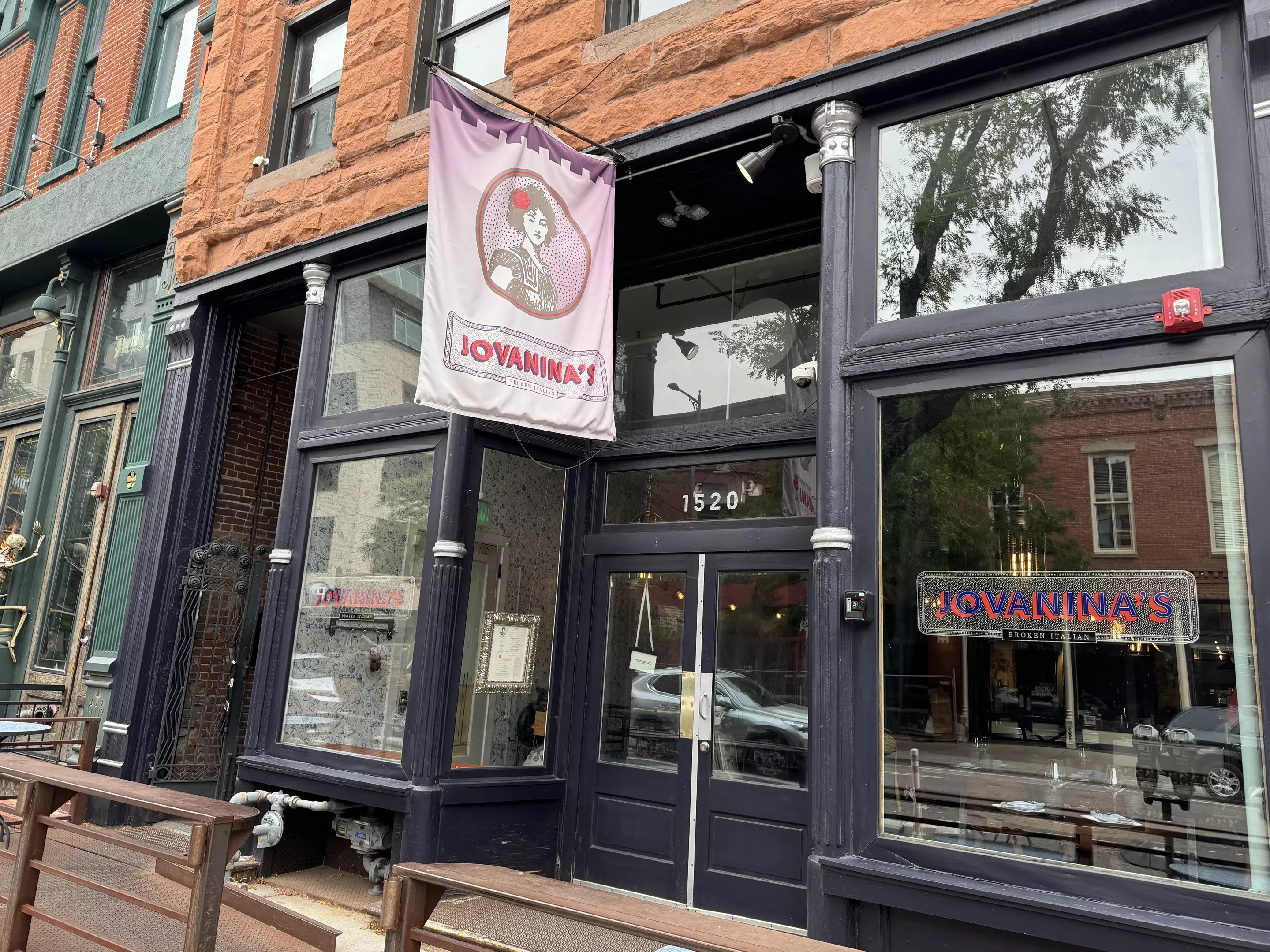
Catie Cheshire

Audio By Carbonatix
Jovanina’s Broken Italian is waving the white flag. Or, more accurately, the downtown restaurant isn’t waving a flag at all, after Denver officials required the business to take down a banner jutting out from the 1520 Blake property, which was designed so that people could find the eatery from either 16th or 15th streets.
“They said, ‘If you don’t take it down, we’re going to start citing you and it’s going to end up being thousands of dollars,’ so I took it down and I’m spending over $13,000 on a new sign,” says Jake Linzinmeir, who owns the restaurant.
Finding a sign that Linzinmeir and the city could agree on has been a years-long challenge. When he originally started developing the LoDo restaurant back in 2018, Linzinmeir says, he had a historic, restored cafe sign that he wanted to put on the building, but the city nixed that idea.
Instead, Linzinmeir installed a window decal sign with the Jovanina’s name. But he needed something people could see from the street, especially once the pandemic shut down restaurants.
So about four years ago he added a temporary banner that stuck out from the building. He designed the banner to fit Denver’s rules for temporary signs, but left it up far longer than the 45-day deadline for temporary signs. He knew the sign had been up too long, he says, but couldn’t imagine taking it down considering how tough times were.
After the pandemic shutdowns, Jovanina’s rebounded somewhat – but then it encountered more challenges from construction work on the 16th Street Mall project. Last summer, one entrance to the 1500 block of Blake was blocked for months. As a result, Linzinmeir says that Jovanina’s lost about 30 percent of its business compared to previous years.
Keeping the sign up helped the drop from becoming more drastic, Linzinmeir says, since it let people know the restaurant was down the street. “We’re just trying to stay open,” he adds.
Last September, the city cited a number of businesses on the 1500 block of Blake for signage-related violations, including Jovanina’s. No fines were issued at the time, but a month later, Linzinmeir heard from the city that the sign had to go.
“Jovanina’s, until recently, had a ‘flag sign’ that is not permitted by city codes,” says Ryan Huff, director of communications for the Denver Department of Community Planning & Development. “CPD notified the business of this on several occasions and had issued a $150 fine on October 4, 2024. Because they no longer have the flag sign up, we have rescinded that fine. There are no forthcoming penalties.”
Linzinmeir didn’t respond to the October 4 notice until a zoning inspector told him on June 3 that his sign needed to be removed by the following day. Though the city hadn’t issued additional citations, Linzinmeir says the inspector said that technically, he could have incurred thousands of dollars in fines for leaving the flag up long beyond the initial citation.
Linzinmeir took that as an indication that the city might issue those fines if he didn’t comply, so he reluctantly took down the flag.
Jovanina’s and the CPD agreed on a new sign that fits city zoning codes in March; it looks like a three-dimensional version of the woman from the banner (a likeness of Linzinmeir’s wife). Linzinmeir says the manufacturer thinks it should be ready in a few weeks, but the timeline is uncertain. In the meantime, he’s worried about what could happen to Jovanina’s.
Adding to that anxiety is the $13,000 that Linzinmeir is spending on the new sign. In the past, he says, the city suggested he showcase a bowl of pasta, which he found “ridiculous” and out of character with the historic building.
“I don’t think they have any idea of what it’s costing people to get these signs that they want,” Linzinmeir says. “I understand having codes and conformity and making things look good. I’ve got zero problems with that. It has to happen. My issue is I feel like there probably needs to be a little compassion about how much it’s costing people and how difficult the restaurant business is in Denver right now.”
He’s particularly frustrated that the city is incentivizing people to fill empty storefronts along 16th Street when just a half a block away, businesses are struggling.
“Our goal is to ensure compliance with the zoning code – not to be punitive,” Huff responds. “We work closely with businesses to inform them about the code and steps they can take to be in compliance before issuing fines.”
But from Linzinmeir’s perspective, Denver is just too punitive a place to try to do business. He’s helped open restaurants across the country and his wife owns a restaurant in Vail; Linzinmeir says that compared to other municipalities, Denver is much more likely to say “no” and drag its feet.
“I want to get out as fast as I can,” he says. “I would move to a different county or a different city that actually wants me to be there.”
After he received the citation last fall, Linzinmeir listed the 1520 Blake property for sale – but the market isn’t good for sellers, he says. And he’s invested too much into the property and restaurant to leave without selling the building.
“We love restaurants,” Linzinmeir says. “We love opening restaurants. I would never open another restaurant in Denver the way things are.”